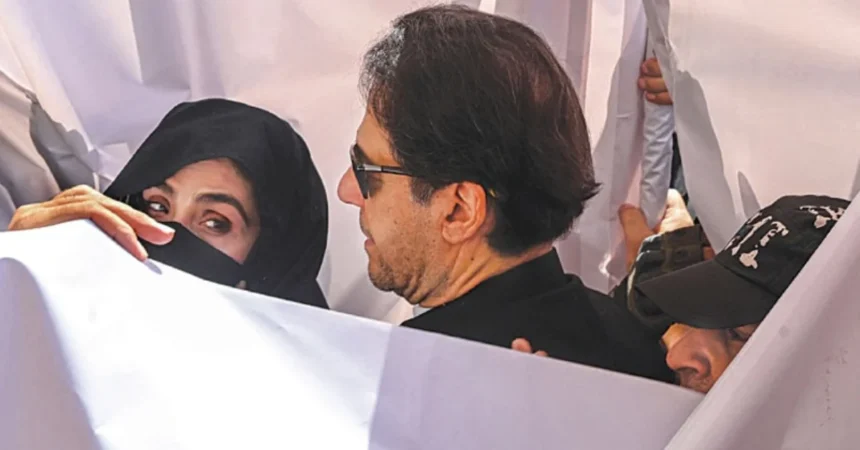In a pivotal ruling, the Islamabad High Court (IHC) has granted bail to Bushra Bibi, the wife of former Prime Minister Imran Khan, in the ongoing Toshakhana case. The court’s decision, which requires a surety bond of one million rupees, comes after extensive arguments highlighting legal precedents, particularly referencing the Justice Qazi Faiz Isa case, where the accountability of a husband for his wife’s actions was a focal point.
Case Background
The Toshakhana case revolves around allegations regarding the misappropriation of gifts received by state officials, including those held by the Toshakhana, a government repository for gifts received by officials from foreign dignitaries. The central accusation is that Bushra Bibi did not properly declare certain gifts, which are alleged to have been improperly retained. The case has significant political ramifications, especially given its ties to Imran Khan, the founder of the Pakistan Tehreek-e-Insaf (PTI) party.
The legal proceedings surrounding this case have drawn public attention not only for their implications on the Khan family but also for their reflection on the broader themes of accountability and transparency in Pakistan’s political landscape. The court’s decision to grant bail has added another layer of complexity to an already contentious political environment.
Court Proceedings and Arguments
During the hearing, Justice Mian Gul Hasan Aurangzeb scrutinized the legal basis for implicating Imran Khan in the case, questioning the rationale behind making him an accused if Bushra Bibi had not submitted the gifts in question. His inquiries highlighted the principle of accountability within marriages, as exemplified by the Justice Isa case, where the legal system grappled with holding one partner accountable for the actions of another.
The FIA prosecutor, Umeer Majeed, emphasized the importance of declaring gifts received by state officials, arguing that such gifts must remain state property unless purchased legally. He stressed that public officials are expected to adhere to strict guidelines regarding the handling of gifts to maintain transparency and integrity in governance.
Justice Aurangzeb also raised important questions about the ethical implications of gift retention, noting that public officials are held to higher standards of accountability compared to private citizens. His remarks echoed a sentiment that is increasingly relevant in the context of global governance, where public trust hinges on transparency and ethical conduct.
Parallels with Justice Isa Case
The bail decision was significantly influenced by the precedent set in the Justice Qazi Faiz Isa case. In that case, the Supreme Court of Pakistan ruled on the complexities of accountability, determining that it was inappropriate to hold a husband liable for his wife’s financial actions without clear evidence linking him to those actions. Justice Aurangzeb drew parallels between this case and Bushra Bibi’s situation, questioning whether the same principles should apply.
This approach highlights an essential aspect of Pakistani law, where the dynamics of personal relationships can influence legal accountability. The court’s willingness to reference previous rulings indicates a desire to establish a consistent legal framework that protects individuals from undue blame based solely on their marital status.
Valuation of Gifts and International Practices
Another critical aspect discussed during the hearing was the valuation of gifts received by officials. Justice Aurangzeb noted the necessity of accurately estimating the worth of such items, suggesting that proper auctions should be conducted to determine their market value. This proposal reflects a growing recognition of the importance of transparency in governmental transactions and the need for systems that prevent potential misuse of state assets.
Drawing on international practices, the court observed that many world leaders retain gifts received during official visits according to established guidelines. This comparison serves to reinforce the idea that there should be clear policies governing the retention of gifts, emphasizing that public officials must adhere to practices that align with international norms.
The discussions around gift valuation also raise pertinent questions about how state assets are managed and the potential for reform in existing laws governing state gifts. The court’s observations reflect a broader societal concern regarding the ethical implications of public officials handling gifts and the potential for corruption if appropriate measures are not in place.
Implications for Bushra Bibi and PTI
The IHC’s decision to grant bail to Bushra Bibi provides her with temporary relief amid ongoing legal challenges. However, the ramifications of this case extend beyond her personal circumstances. The PTI, under Imran Khan’s leadership, faces significant scrutiny as it navigates the complexities of accountability and governance in Pakistan.
The Toshakhana case has become a focal point for opposition parties seeking to undermine the PTI’s credibility. The perception of corruption and mismanagement among public officials is a potent political weapon, and how the PTI addresses these allegations will be crucial for its future electoral prospects.
As the legal proceedings continue, the political fallout from this case is likely to intensify. The PTI’s ability to manage public perception and respond to allegations will play a critical role in shaping the party’s narrative and maintaining support among its base.
Broader Themes of Accountability and Governance
The Toshakhana case and the bail decision for Bushra Bibi are reflective of broader themes surrounding accountability in Pakistan. As the country grapples with challenges related to corruption and governance, the legal outcomes of high-profile cases such as this one can have far-reaching consequences.
The emphasis on transparency and accountability is becoming increasingly important in the context of Pakistan’s political landscape. Public demand for ethical governance is on the rise, and the judicial system’s role in ensuring accountability among public officials is critical to restoring trust in government institutions.
Furthermore, the public discourse surrounding the Toshakhana case highlights the need for comprehensive reforms in how gifts and state assets are managed. As discussions about governance evolve, there is an opportunity for lawmakers to revisit existing laws and establish clearer guidelines that align with international best practices.
Future Legal Proceedings
As Bushra Bibi secures bail, the legal proceedings surrounding the Toshakhana case are far from over. The court’s decision allows her to remain free temporarily, but the implications of the case will continue to unfold in the coming weeks and months. The focus will shift to how the prosecution and defense build their cases, as well as the evidence presented in court.
The upcoming legal battles will be crucial not only for Bushra Bibi and Imran Khan but also for the political landscape in Pakistan. How the judicial system navigates these complex issues will serve as a litmus test for its commitment to accountability and justice.
In addition to the Toshakhana case, broader political dynamics will play a significant role in shaping the narrative surrounding the PTI. The party’s ability to respond to allegations and maintain a strong public image will be essential as it seeks to navigate an increasingly polarized political environment.
Public Reactions and Political Ramifications
The public reaction to the IHC’s decision has been mixed, with supporters of the PTI celebrating the bail as a victory for justice, while critics view it as indicative of the challenges facing Pakistan’s accountability mechanisms. Social media platforms have become battlegrounds for these differing narratives, reflecting the deeply divided political landscape in the country.
The implications of this case extend beyond the courtroom, influencing public opinion and the political discourse in Pakistan. As the PTI seeks to solidify its support base, how it frames the narrative surrounding the Toshakhana case will be critical for maintaining its position in the political arena.
Moreover, opposition parties are likely to leverage this case as a means to mobilize their support and critique the PTI’s governance. The interplay between legal proceedings and political maneuvering will shape the future of both the PTI and its opponents as they navigate this complex landscape.
A Case to Monitor
The Islamabad High Court’s decision to grant bail to Bushra Bibi marks a significant moment in the Toshakhana case, highlighting the interplay between legal accountability and political dynamics in Pakistan. As the legal proceedings progress, the implications for the PTI and broader questions of governance and transparency will remain at the forefront of public discourse.
This case underscores the need for a robust legal framework that addresses the complexities of accountability among public officials. As Pakistan continues to confront challenges related to corruption and governance, the outcomes of high-profile cases like this one will be critical in shaping the future of the country’s political landscape.
The evolving narrative around the Toshakhana case will undoubtedly serve as a touchstone for discussions about ethics, accountability, and the role of the judiciary in maintaining the rule of law.
#BushraBibi #Toshakhana #IHC #JusticeIsa #PakistanPolitics #Accountability #ImranKhan #LegalNews







